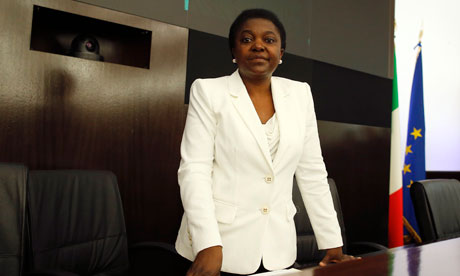
Cécile Kyenge, the
Italian minister for integration: her 'rise to the cabinet led to an
outpouring of racism and hatred'. Photograph: Tony Gentile/REUTERS
"I love animals, but when I see her, I can't help but think of an orangutan". These words were uttered by the Italian politician Roberto Calderoli in reference to Cécile Kyenge,
Italy's black minister of integration, at a recent festival organised
by his party, the Northern League. Kyenge was appointed to the cabinet
in April, and Calderoli added that "maybe Kyenge should be a minister in
her own country [sic] … she is only encouraging illegal immigrants to
dream of success".
Calderoli's is the latest in a long line of revolting racist comments from politicians and others from right across the political spectrum. Incredibly, Calderoli himself claimed that what he had said was a "little joke" and that it was "not racist". What is going on here? Why has Kyenge's rise to the cabinet led to such an outpouring of racism and hatred?
When I started living in Italy in 1988 (in Milan), immigrants were few and far between. Things changed in the 1990s and 2000s as more than 4 million foreign workers arrived to work largely, at first, in the "dirty" sector of a booming economy. Italy's ageing population and increasing wealth led to huge demand for cleaners, home helpers and ordinary workers – all jobs Italians were no longer willing to do in large numbers.
These immigrants were excluded from the political system, and restrictive citizenship laws made it very difficult for the second and third generation (the so called Balotelli generation) to gain any rights at all. Even those born in Italy had to wait until their 18th birthday before being allowed to become officially Italian. This
was also the context in which the Lega Nord (Northern League) rose to power and prominence.
Kyenge arrived in Italy in 1983, and is a qualified ophthalmologist. She married an Italian man in 1994 and her two daughters were born and have grown up in Italy. She is Italian and black, and has promised to try to reform Italy's citizenship laws, a change the Italian centre-right violently opposes.
Calderoli's is the latest in a long line of revolting racist comments from politicians and others from right across the political spectrum. Incredibly, Calderoli himself claimed that what he had said was a "little joke" and that it was "not racist". What is going on here? Why has Kyenge's rise to the cabinet led to such an outpouring of racism and hatred?
When I started living in Italy in 1988 (in Milan), immigrants were few and far between. Things changed in the 1990s and 2000s as more than 4 million foreign workers arrived to work largely, at first, in the "dirty" sector of a booming economy. Italy's ageing population and increasing wealth led to huge demand for cleaners, home helpers and ordinary workers – all jobs Italians were no longer willing to do in large numbers.
These immigrants were excluded from the political system, and restrictive citizenship laws made it very difficult for the second and third generation (the so called Balotelli generation) to gain any rights at all. Even those born in Italy had to wait until their 18th birthday before being allowed to become officially Italian. This
was also the context in which the Lega Nord (Northern League) rose to power and prominence.
Kyenge arrived in Italy in 1983, and is a qualified ophthalmologist. She married an Italian man in 1994 and her two daughters were born and have grown up in Italy. She is Italian and black, and has promised to try to reform Italy's citizenship laws, a change the Italian centre-right violently opposes.
www.guardian.co.uk























Nenhum comentário:
Postar um comentário